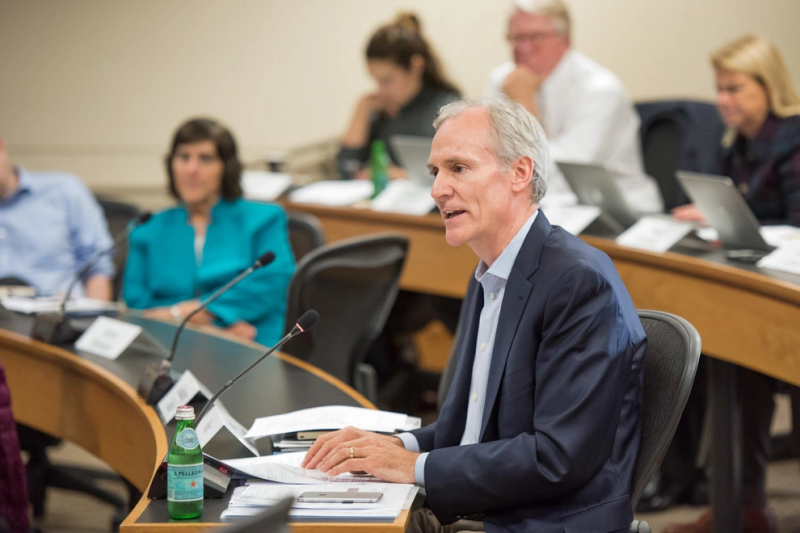The Faculty Senate debated the Elimination of Harmful Language Initiative (EHLI) and the degree to which the University is dedicated to academic freedom at its Thursday meeting.
Faculty put forth and amended a motion to create a committee to gather information about the EHLI and similar initiatives and a competing motion that would require any University policy regulating academic speech to originate from the Faculty Senate. A vote on the motions was postponed to the Senate’s next meeting.
The EHLI, a set of guidelines that identified and suggested alternatives to terms used in IT that the group identified as discriminatory, drew widespread backlash after the Wall Street Journal editorial board took aim at the project. The list was taken down by Stanford in early January.
Vice President for Business Affairs and Chief Financial Officer Randy Livingston said that the intent of the EHLI was “never ever ever to impose this on the University or represent this as anything more than an internal effort within our own organization.” (The initiative was co-sponsored by the Stanford CIO Council and the People of Color in Technology (POC-IT) affinity group.)
Chief Information Officer Steve Gallagher acknowledged that the list, which was expanded beyond IT-specific words over time, should have remained “narrowly focused on technological terms.”
Gallagher said that, as it was explained in a community newsletter, “EHLI aims to address language on technology web pages” and code written across the IT organizations at Stanford participating in the initiative. However, “that’s not how it read on the summary of the actual site itself,” which “was a problem,” Gallagher said.
University administrators defended that academic freedom is a priority at Stanford, with President Marc Tessier-Lavigne describing academic freedom as “paramount” at the University and noting that “no speakers have been disinvited and no conferences have been canceled” in his tenure.
Provost Persis Drell added that the University is “committed to creating an inclusive environment but always consistently with academic freedom.”
Mechanical engineering professor Juan Santiago and political science professor Anna Grzymala-Busse presented a motion to establish an ad hoc faculty committee to gather more information on EHLI and investigate whether there are other, similar initiatives at Stanford.
Santiago said that examples of programs to be investigated included the Anti-Racism Toolkit and Protected Identity Harm (PIH) Reporting, which he said were “more extreme and more worrisome than this EHLI.” The Anti-Racism Toolkit contains guidelines to “support dialogue about racism within the Stanford staff community” and ways to engage in behavior that advances racial justice, according to its website. The University’s PIH Reporting process enables community members to report conduct that unfairly targets protected characteristics like race, sexual orientation and gender identity. Stanford collects data on the incidents and attempts to help community members affected by them but does not investigate them or impose sanctions based on them.
Santiago cited what he described as guidelines on “how to think” and “how to talk to people” as reasons for scrutinizing the Anti-Racism Toolkit. Santiago said that the Protected Identity Harm Reporting website “encouraged” members of the community to “report on others anonymously” and that it had a “big red button” leading to the website of an external vendor “who collects the information and then the University promises that they will take action, maybe restore justice.”
Grzymala-Busse said that there was an issue of transparency around such initiatives. She also raised the concern that most faculty “have been marginalized” and said that initiatives like EHLI, which was mainly led by staff, raise the question of “who gets to decide what faculty can and can’t do.”
Comparative literature professor and Hoover Institution senior fellow Russell Berman spoke in favor of the motion. He said that “EHLI has been a catastrophe for the University,” and it has “shaken the faith of faculty and students in the University’s commitment to academic freedom and free speech.” By its logic, faculty would “not be able to teach poems by T. S. Eliot,” because “their antisemitism may cause harm,” Berman said. “This is not a healthy atmosphere. The way to fix it is by rebalancing faculty oversight on a university run increasingly by administrators.”
“Under what circumstances can an administrator establish a University policy that restricts or regulates academic freedom?” electrical engineering professor Philip Levis asked of Tessier-Lavigne. (Tessier-Lavigne responded, “Never.”)
Levis expressed opposition to the motion to establish a committee and introduced a motion to substitute it with adopting a statement asserting that “any University policy to regulate academic speech and the exchange of ideas must originate from the Faculty Senate.”
Senators voted against an amendment to the motion to establish a faculty committee on University speech initiatives that would have appended to it the text of the substitute motion introduced by Levis. Senators also voted for amendments to remove references to EHLI from and to change the wording of the introductory paragraph of the motion to establish a faculty committee. Further discussion and a final vote on both motions were postponed.
